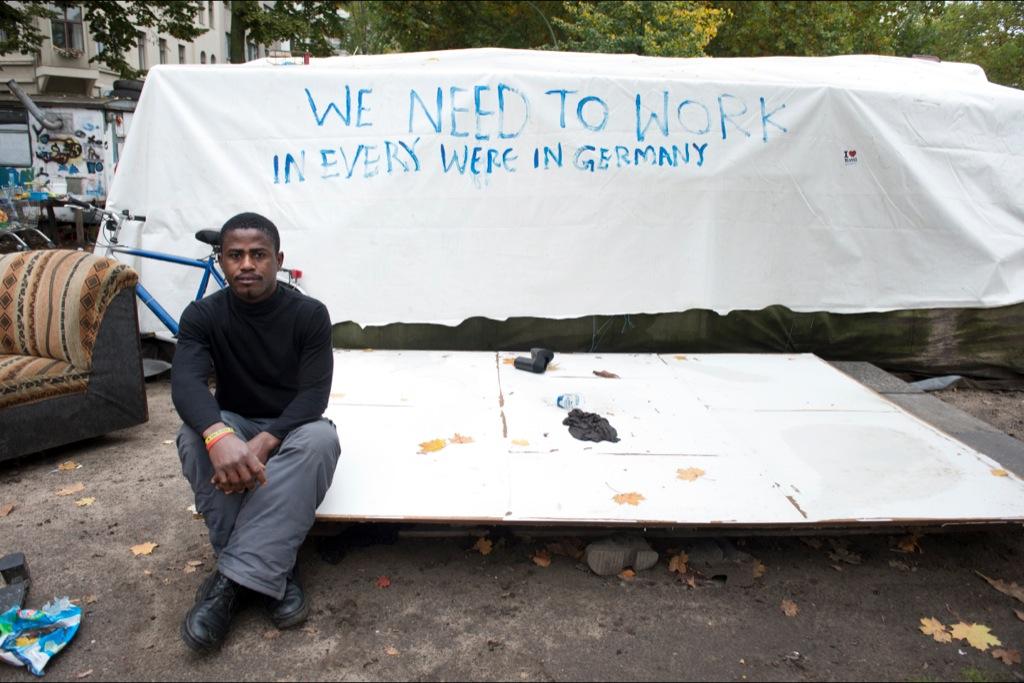Germany faces refugee crisis as calls to accept more migrants mount
Ghanaian refugee Johnson Takyi poses at an improvised refugee camp in Berlin’s Oranienplatz on Oct. 16. Takyi, who fled Libya’s civil war by ship to the Italian island of Lampedusa, fears his brother was one of the hundreds of victims of this month’s Lampedusa shipwreck.
BERLIN, Germany — Scores of undocumented migrants living in an improvised tent city in the hip Berlin neighborhood of Kreuzberg are protesting Germany's continued failure to provide them with the housing and jobs they need to integrate into mainstream society.
Their demonstrations come in the wake of the tragic deaths of hundreds of refugees off the Italian island of Lampedusa earlier this month after a ship carrying migrants from Eritrea and Libya caught fire and sank. It was the worst Mediterranean refugee disaster on record, and has drawn condemnation of what one aid group called Europe's "war against migrants."
“We are animals! Just say it! Where is our freedom? What do you want us to do to get the attention of the government?” Bashir Zakari, a Nigerian immigrant, shouted in the faces of Berlin police officers at a Wednesday demonstration in Oranienplatz, or Orange Square.
Following the deaths of around 350 refugees off Lampedusa, European officials have mounted calls for Germany to accept larger numbers of asylum seekers to reduce the burden on Italy and other nations within striking distance for leaky boats from Africa.
But Germany is increasingly unwilling to accept new refugees, and German officials are now pushing for additional curbs to prevent migrants who land in other countries from making their way to the supposedly greener pastures of Europe's most vibrant economy.
“Germany is [already] the country that takes in the most refugees in Europe,” German Interior Minister Hans-Peter Friedrich told reporters last week, after calling for a “re-entry ban” for deportees not eligible for political asylum.
Last year, Germany officially accepted around 80,000 refugees, mostly from conflicts in Africa and the Middle East. This year it is set to accept an estimated 100,000, according to a recent report by the European Asylum Support Office. However, the state is groaning under the burden of the new migrants. Germany has proven unable to cope with housing and employing the refugees who are encouraged to move here by the cash-strapped governments of “front-line” countries like Greece or Italy.
“The Italians are kicking people out,” said 38-year-old Issa Ali, a Libyan refugee who has been living in Germany for the past year. “They gave us papers, and said, 'You can go everywhere in Europe,' and they sent us on our way.”
Under German law, refugees who can prove they face political persecution at home may attain a three-year residence permit that can later be converted to permanent residency. But the process is tortuous and time-consuming.
Refugees like those living in tents in Berlin's Oranienplatz argue that they must be allowed greater freedom to move around the country and look for work as the government dithers over their status.
“We are tired! We want to be useful! We don't want to be like this,” Zakari told GlobalPost. “Give us our right to work! Give us our right to live!”
Asylum seekers are required by law to remain in the city or town where they were originally issued a stay of deportation, living in state-run shelters or camps that resemble detention centers. Though they receive a stipend of 400 euros per month, they are not permitted to work for more than 1 euro per hour until their asylum status is made official.
More than a year after their arrival here, the refugees at Oranienplatz are still waiting for that to happen.
In some parts of Germany asylum seekers are forced to live in wooded areas outside of towns, according to Fanny Dethloff, a Lutheran minister who works on behalf of refugees in Hamburg. Moreover, asylum seekers who have not been registered often fall through the cracks and do not receive any official aid, Dethloff said. Others are sometimes forced to buy food and supplies from pricey shops inside the refugee camps or with coupons that are only valid in expensive supermarkets.
Around 200 asylum seekers like Zakari abandoned their official quarters in cities across Germany and marched to Berlin last October, setting up the tent camp in the Oranienplatz to draw attention to their plight. They organized additional protest camps in Hamburg, Munich, Eisenhüttenstadt and Duisburg.
But as Ali explains, the protests have had little impact, and the living conditions for the unofficial migrants remain miserable.
“Do you think that people want to sleep with rats? Do people want to wake up with rats? Do people want to eat with rats?” he asked.
“If right now, I got an opportunity to go back to my country [for work], I'm ready to go.”
Every day, reporters and producers at The World are hard at work bringing you human-centered news from across the globe. But we can’t do it without you. We need your support to ensure we can continue this work for another year.
Make a gift today, and you’ll help us unlock a matching gift of $67,000!
